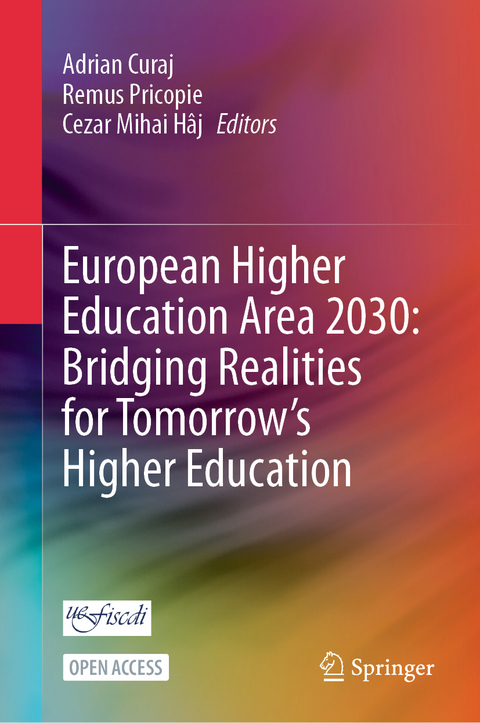
European Higher Education Area 2030: Bridging Realities for Tomorrow’s Higher Education
Springer International Publishing
978-3-031-75139-4 (ISBN)
- Noch nicht erschienen - erscheint am 27.01.2025
- Versandkostenfrei
- Auch auf Rechnung
- Artikel merken
This open access book presents the major outcomes of the fifth edition of the Future of Higher Education - Bologna Process Researchers' Conference (FOHE-BPRC5), organized by the Executive Agency for Higher Education, Research, Development and Innovation Funding (UEFISCDI) prior to the 2024 Ministerial Conference in Tirana.
The Conference is considered a landmark in the European Higher Education Area, encouraging dialogue between researchers and policy-makers. The resulting book provides a forward-looking perspective on how the EHEA is evolving in response to current challenges and opportunities, by focusing on topics such as internationalization, equity and employability, fundamental values, impact of digitalization or innovative learning and teaching. The papers presented offer insights in these areas, illustrating successful or failed implementations within the EHEA and are published in open access format to ensure that the researchers' perspectives are widely available to European policy and decision makers.
Since 2024 marks the first post pandemic edition of the Conference, it is a good moment to not only to take stock of the challenges brought by the Covid-19 pandemic and the war in Ukraine, but also to explore how scientific research can support policy into shaping the directions for the future to come.
Adrian Curaj is a former minister of education, science and innovation. He is the head of the UNESCO Chair on Science and Innovation Policies at the National University of Political Studies and Public Administration. He had been working as a consultant for the World Bank, UNESCO, UNIDO, ETF and EC for studies in Tertiary Education, Science and Innovation and Foresight. Also, Adrian CURAJ is fellow of the World Academy of Art & Science (WAAS). He has been at the forefront of theory & practice of Smart Specialization and Open Science in Romania since the beginning of its development. Adrian Curaj is Conference co-chair for all editions of the Future of Higher Education – Bologna Process Researchers’ Conference (2011, 2014, 2017, 2020, and 2024). Cezar Mihai Hâj holds a PhD in Political Science from the National University of Political Studies and Public Administration (SNSPA) in Bucharest. His experience as policy expert includes coordinating a number of studies on internationalization, equity, university management, internal quality assurance and data collection. He has written articles in Springer and Central European University publications and co-authored the “Study on the impact of admission systems on higher education outcomes” commissioned by the DG-EAC. He is a member of the Bologna Follow-Up Group (BFUG) and co-chair of the Fundamental Values WG. He is currently digital expert for the World Bank and the European Digital Education Hub. Remus Pricopie is professor and Rector of the National University of Political Studies and Public Administration (SNSPA), Bucharest, since March 2012. Mr. Pricopie served as Minister of Education and Research from December 2012 to December 2014. His activity within the Romanian Ministry began in 1996 and includes positions such as Spokesperson, Director, Secretary-General and Deputy Minister for Higher Education, International Relations and Teacher Training. Also, he has extensively collaborated with UNESCO, UNICEF, EU, OECD, World Bank, United Nations University – and ministries of education and research from more than 100 countries. Prof. Pricopie holds a PhD in Political Science at SNSPA and he is a Fulbright New Century Scholar alumnus, and member of the World Academy of Art and Science, the Romanian Chapter of the Club of Rome and the Atlantis Group. Dr. Pricopie has been Chair of the Task Force on Fostering and Building Human Capital of the Regional Cooperation Council and President of the Board of Directors of the Romanian-US Fulbright Commission. He held the positions of Vice-president of the International Association of Universities (2012-2022) and President of the EU-Latin America and Caribbean Permanent Academic Forum (2018-2022). Since 2021, he has been President of the World University Consortium. Dr. Pricopie’s activity of encompasses trans-disciplinary research in the areas of higher education management, internationalisation of higher education, public communication, public participation and collaborative public management.
Twenty Five Years of Bologna Process. The Coexistence of Different Frameworks and the Challenges for the European Higher Education Area.- Part I Internationalization of Higher Education - Beyond 2020 EHEA Targets.- Internationalisation and Europeanisation of Higher Education Beyond EHEA Targets: Inclusion, Transformation, and Social Responsibility.-Internationalisation or Europeanisation? Capturing Dynamic Concepts in Higher Education Institutions.- Bologna Process and the Internationalisation of the Third Mission of the University: Completing the Policy Script.- Exploring Services and Support for Credit-Mobile International Students.- Internationalization in Europe in 2024: Data-Driven Insights From the Frontlines.- The Role of Erasmus+ Capacity Building Projects in the Internationalization of Armenian Higher Educations.- Study-abroad Portals in the EHEA: A Case Study of the Study in Romania Platform.- The Role of Language Preparatory Programme in Increasing the Participation of International Students in Higher Education in Romania.- Higher Education Spaces as Immigration Sites: A Critical Examination.-Exploring Academics' Views Regarding Erasmus Teaching Mobility.- The European Universities Initiative (EUI): Accomplishments and Challenges.- Part II Access, Inclusion, Completion, and Employability - Responding to the Needs of Students and Society.-Access, Inclusion, Completion, and Employability - Responding to the Needs of Students and Society.- The Social Dimension of Higher Education: An Exploratory Study for the Validation of Quality Assurance Indicators.- Beyond the Binary: A Comparative Analysis Across Europe of Non-Binary Student Experiences and Methodological Considerations for Gender Measurement.- Social Inequality Contested: Prior Learning Assessment in the Context of Displacement.- The Need for Tailored Support for Long-Term Students in Informatics Bachelor's Programmes.- Do Early Signals Count? Exploring Potential Root Causes of University Dropout.-Students With Delayed Transition Across Europe: an Often Overlooked Group.- Connecting Academia and Business on the Quadruple Helix. Employers.- Support to Optimise Training in Higher Education.- Ascending the Social Ladder: Exploring Professional Advancement and Employability Among First Generation Graduates.- Part III Building an EHEA Furthering the Fundamental Values of Higher Education.- Tracking a Remarkable Intellectual and Policy Journey: Building a European Higher Education Area Furthering the Fundamental Values of Higher Education.-The Emergence and Design of a Transnational Policy Tool: Monitoring the Fundamental Values of Higher Education in the European Higher Education Area.- The Future of Fundamental Values in the EHEA: the Russian War on Ukraine and Re-Thinking Safeguards Against Non-Democracies.- Digitalisation v. the Values of Higher Education: Opportunities, Threats, Recommendations for the EHEA.- Frameworks for Doctoral Education: Academic Freedom of Doctoral Candidates Across Europe.- Newly Emerging Frameworks of Reference and Conceptual References for Academic Freedom: Institutional, National, Regional, and Global.- Part IV Digitalization and the Future of European Higher Education: Implications for Public Policies.- Bologna Process in the Era of Digital Transformations and New EU Initiatives.-Conversations With a Purpose: The Impact of ChatGPT Among Higher Education Students.- Leveraging International Platforms and Projects for Industry x.0 Skills in Higher Education.- Why Digitalize? An Investigation of Virtual Internationalization Governance in German Higher Education.- Exploring Degrees of Connection: Challenges and Acceptance of the European Degree Label towards Shaping the Future of Higher Education.- Part V Innovative Teaching and Learning Towards a Sustainable and Effective Student-Centered Learning.- Learning and Teaching and the Student-Centred Approach. New Perspectives on the Oldest Bologna Process Priority.- Academics at the Core of Student-Centered Teaching and Learning: Lessons Learned From the Experience of the Center of Academic Development of the West University of Timisoara University Teachers' Willingness to Support Inclusive and Effective Student Centred Learning.- Promoting Student-Centered Teaching Through a Professional Development Program for Academics A Mixed Study.- Student-Centred Learning in Higher Education: Relevant Quality Assurance Indicators One-Time Pedagogical Events to Teach Academics Instructional Models and the Effect on Students' Perceptions of Teaching Effectiveness.
| Erscheint lt. Verlag | 27.1.2025 |
|---|---|
| Zusatzinfo | XIV, 777 p. 90 illus., 66 illus. in color. In 2 volumes, not available separately. |
| Verlagsort | Cham |
| Sprache | englisch |
| Maße | 155 x 235 mm |
| Themenwelt | Sozialwissenschaften ► Pädagogik ► Erwachsenenbildung |
| Schlagworte | Access, inclusion, completion and employability • Digitalization and the future of European higher education: • Effective student-centered learning • internationalization of higher education • open access • Sustainable student-centered learning • The fundamental values of higher education |
| ISBN-10 | 3-031-75139-6 / 3031751396 |
| ISBN-13 | 978-3-031-75139-4 / 9783031751394 |
| Zustand | Neuware |
| Informationen gemäß Produktsicherheitsverordnung (GPSR) | |
| Haben Sie eine Frage zum Produkt? |
aus dem Bereich


